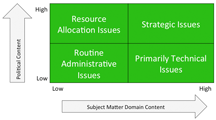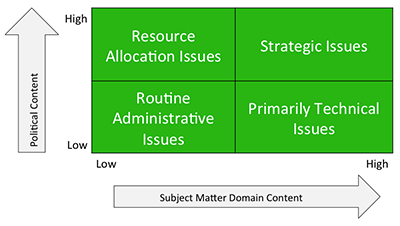
The Politics by Subject Matter matrix. View a larger image
In addition  to administrative tasks such as agenda setting, most team meetings cover a mix of information distribution, status reporting, issue reporting, issue clarification, and problem solving. But meetings are so expensive and difficult to schedule — and as many say, so painful — that shortening them or making them less frequent is a real benefit. One approach to shortening regular team meetings is to move to broadcast media such as email or podcasts any meeting content that doesn't actually require real-time interaction. That would include most information distribution and status reporting. So let's set them aside.
to administrative tasks such as agenda setting, most team meetings cover a mix of information distribution, status reporting, issue reporting, issue clarification, and problem solving. But meetings are so expensive and difficult to schedule — and as many say, so painful — that shortening them or making them less frequent is a real benefit. One approach to shortening regular team meetings is to move to broadcast media such as email or podcasts any meeting content that doesn't actually require real-time interaction. That would include most information distribution and status reporting. So let's set them aside.
Solving problems of any significant difficulty is probably best approached not in regular team meetings, but in meetings dedicated to solving those problems. There we can ensure we have the time, information, and people we need to evaluate progress on working the problem, to develop new candidate solutions, and to set task assignments for further investigations. So let's set problem solving aside as well.
What remains for regular team meetings, for the most part, is issue reporting and issue clarification. If we spend our time in team meetings focusing on uncovering issues and clarifying them to the extent we can with what we now know, we can shorten meetings and get back to work. This is especially useful for standup meetings, which are intended to be short.
Unfortunately, achieving this objective is rarely straightforward. Pitfalls abound. With that in mind, I offer a set of guidelines for avoiding the pitfalls of issues-only team meetings.
- Preparation is even more necessary
- Compared to the Compared to the way most regular
team meetings are conducted, the
effectiveness of issues-only team
meetings is more dependent on
diligent preparation by team membersway most regular team meetings are conducted, the effectiveness of issues-only team meetings is more dependent on diligent preparation by team members. Team members must have a current understanding of the material that has been shifted to other channels, including the information and status reports that were moved to podcasts or email. And the larger team is relying on the problem-solving subteams for timely and lucid reports if they encounter new issues. - Circulate an "open issues" summary in advance
- Raising an issue that has already been raised is a waste of time, but a brief discussion might be necessary if its status has changed in a material way that might affect anyone beyond the team members who are pursuing the issue. Team members must receive and digest these summaries in advance of the issues-only team meeting.
- Classify issues using the Politics by Subject Matter matrix
- The Politics by Subject Matter matrix is a 2x2 matrix for classifying issues. [Lowy 2004] Its vertical axis corresponds to increasing importance of the political content of an issue: Low to High. Its horizontal axis corresponds to increasing importance of the subject matter content of an issue: Low to High. Political content relates to resource allocation and availability, or to organizational support for (or opposition to) activity related to the issue — essentially, whether or when we attend to the issue. Subject matter content relates to the methods for attending to the issue — essentially, how we resolve the issue.
- As shown in the diagram, the cells of the matrix are Routine Administrative Issues [Low Political, Low Subject Matter], Resource Allocation Issues [High Political, Low Subject Matter], Primarily Technical Issues [Low Political, High Subject Matter], and Strategic Issues [High Political, High Subject Matter].
- Begin the process of issue clarification by classifying new issues according to this matrix. After this conversation, determine whether the issue is one that the team has authority, capability, and capacity to resolve. If the issue is within the team's authority, capability, and capacity, assign a task team to deal with it. If the issue is beyond the team's authority, capability, or capacity, bring the issue to the attention of people who can attend to it, and move on.
- Avoid trying to resolve issues in regular team meetings
- A common anti-pattern in team meetings is premature problem solving. We waste much time solving problems and addressing issues before we have enough information and awareness to ensure that the solutions we find will be workable — or even relevant. (See "The Solving Lamp Is Lit," Point Lookout for September 6, 2006.) Issues-only meetings are for surfacing or clarifying issues, not for resolving them.
Some have expressed concern that issues-only meetings might be very difficult and tense. There is a risk that these meetings can become blamefests, especially if all or most of the issues seem to point in the direction of a few team members. One way to manage this risk is to adjust the culture of the team. Ensure that the team culture includes an understanding that although we might divide our work into tasks to be pursued by specific people, the tasks are all interconnected. An issue that surfaces in the context of one task isn't necessarily a result of malpractice by anyone — including the people responsible for that task. Any issue can have its source in multiple other tasks, or even in work that's beyond the responsibility of the team as a whole. Discovering an issue is most likely a gift — a contribution to the work of the team, rather than a hindrance to achieving success. ![]() Top
Top ![]() Next Issue
Next Issue
Do you spend your days scurrying from meeting to meeting? Do you ever wonder if all these meetings are really necessary? (They aren't) Or whether there isn't some better way to get this work done? (There is) Read 101 Tips for Effective Meetings to learn how to make meetings much more productive and less stressful — and a lot more rare. Order Now!
Footnotes
Your comments are welcome
Would you like to see your comments posted here? rbrenaXXxGCwVgbgLZDuRner@ChacDjdMAATPdDNJnrSwoCanyon.comSend me your comments by email, or by Web form.About Point Lookout
 Thank you for reading this article. I hope you enjoyed it and
found it useful, and that you'll consider recommending it to a friend.
Thank you for reading this article. I hope you enjoyed it and
found it useful, and that you'll consider recommending it to a friend.
This article in its entirety was written by a human being. No machine intelligence was involved in any way.
Point Lookout is a free weekly email newsletter. Browse the archive of past issues. Subscribe for free.
Support Point Lookout by joining the Friends of Point Lookout, as an individual or as an organization.
Do you face a complex interpersonal situation? Send it in, anonymously if you like, and I'll give you my two cents.
Related articles
More articles on Effective Meetings:
 Games for Meetings: III
Games for Meetings: III- We spend a lot of time and emotional energy in meetings, much of it engaged in any of dozens of ritualized
games. Here's Part III of a little catalog of some of our favorites, and what we could do about them.
 I Could Be Wrong About That
I Could Be Wrong About That- Before we make joint decisions at work, we usually debate the options. We come together to share views,
and then a debate ensues. Some of these debates turn out well, but too many do not. Allowing for the
fact that "I could be wrong" improves outcomes.
 Pre-Decision Discussions: Facts
Pre-Decision Discussions: Facts- The purpose of some meetings is reaching decisions. Because decision making can be difficult, familiarity
with the forms of contributions that can occur in such discussions is helpful. Their connection to facts
is critical.
 The Six Dimensions of Online Disinhibition: II
The Six Dimensions of Online Disinhibition: II- The online disinhibition effect appears in computer-mediated communications. It is due to relaxation
of inhibitions that demand civility. It's still impactful 20 years after its identification, but it
might be less so in today's workplace cyberspace.
 Exploitation and Conversational Narcissism at Work: I
Exploitation and Conversational Narcissism at Work: I- Exploitation of others is one of four themes of conversational narcissism. Knowing how to recognize
the patterns of conversational narcissism is a fundamental skill needed for controlling it. Here are
five examples that emphasize exploitation of others.
See also Effective Meetings for more related articles.
Forthcoming issues of Point Lookout
 Coming October 1: On the Risks of Obscuring Ignorance
Coming October 1: On the Risks of Obscuring Ignorance- A common dilemma in knowledge-based organizations: ask for an explanation, or "fake it" until you can somehow figure it out. The choice between admitting your own ignorance or obscuring it can be a difficult one. It has consequences for both the choice-maker and the organization. Available here and by RSS on October 1.
 And on October 8: Responding to Workplace Bullying
And on October 8: Responding to Workplace Bullying- Effective responses to bullying sometimes include "pushback tactics" that can deter perpetrators from further bullying. Because perpetrators use some of these same tactics, some people have difficulty employing them. But the need is real. Pushing back works. Available here and by RSS on October 8.
Coaching services
I offer email and telephone coaching at both corporate and individual rates. Contact Rick for details at rbrenaXXxGCwVgbgLZDuRner@ChacDjdMAATPdDNJnrSwoCanyon.com or (650) 787-6475, or toll-free in the continental US at (866) 378-5470.
Get the ebook!
Past issues of Point Lookout are available in six ebooks:
- Get 2001-2 in Geese Don't Land on Twigs (PDF, )
- Get 2003-4 in Why Dogs Wag (PDF, )
- Get 2005-6 in Loopy Things We Do (PDF, )
- Get 2007-8 in Things We Believe That Maybe Aren't So True (PDF, )
- Get 2009-10 in The Questions Not Asked (PDF, )
- Get all of the first twelve years (2001-2012) in The Collected Issues of Point Lookout (PDF, )
Are you a writer, editor or publisher on deadline? Are you looking for an article that will get people talking and get compliments flying your way? You can have 500-1000 words in your inbox in one hour. License any article from this Web site. More info
Follow Rick
Recommend this issue to a friend
Send an email message to a friend
rbrenaXXxGCwVgbgLZDuRner@ChacDjdMAATPdDNJnrSwoCanyon.comSend a message to Rick
![]() A Tip A Day feed
A Tip A Day feed
![]() Point Lookout weekly feed
Point Lookout weekly feed
 My blog, Technical Debt for Policymakers, offers
resources, insights, and conversations of interest to policymakers who are concerned with managing
technical debt within their organizations. Get the millstone of technical debt off the neck of your
organization!
My blog, Technical Debt for Policymakers, offers
resources, insights, and conversations of interest to policymakers who are concerned with managing
technical debt within their organizations. Get the millstone of technical debt off the neck of your
organization!